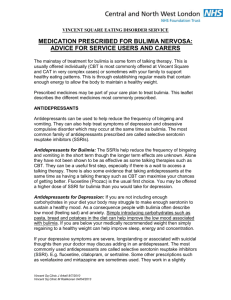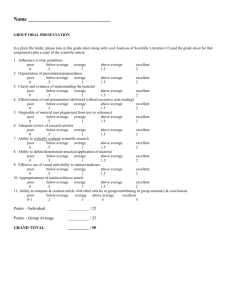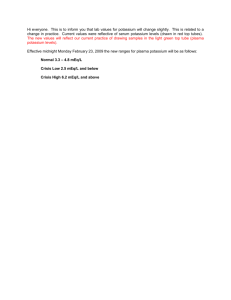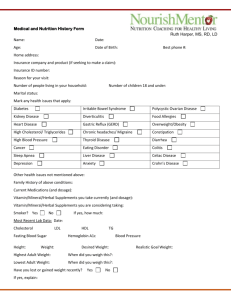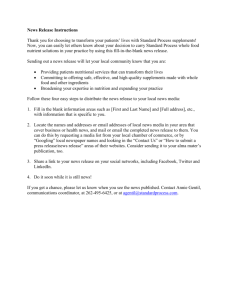Medication prescribed for people with anorexia nervosa: Information
advertisement
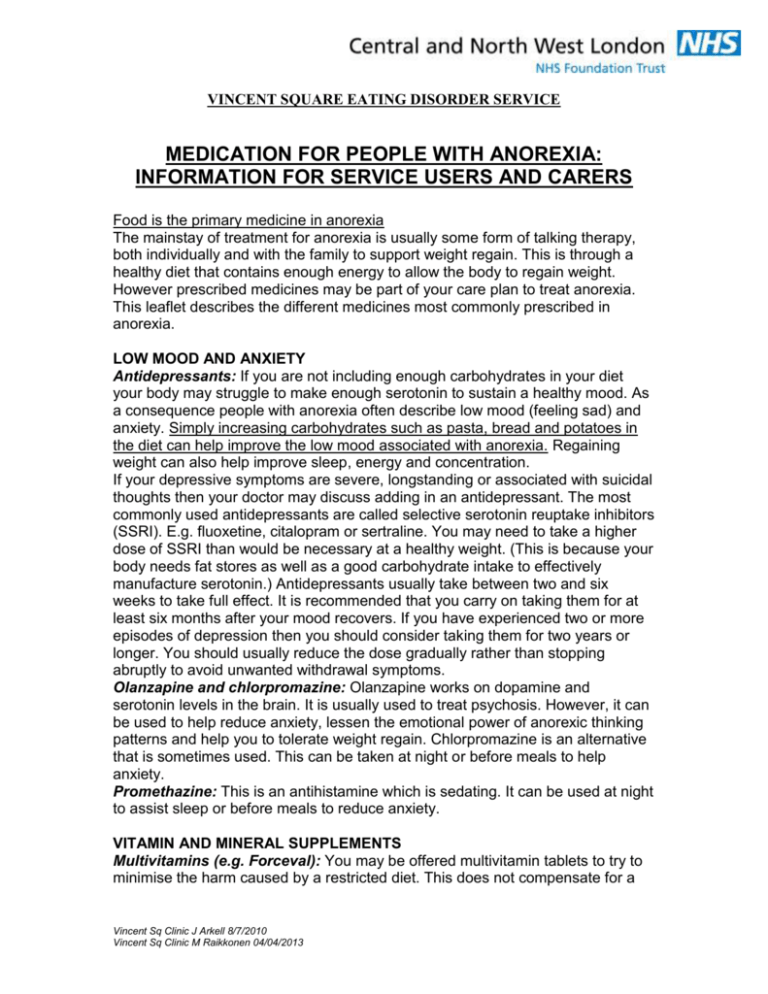
VINCENT SQUARE EATING DISORDER SERVICE MEDICATION FOR PEOPLE WITH ANOREXIA: INFORMATION FOR SERVICE USERS AND CARERS Food is the primary medicine in anorexia The mainstay of treatment for anorexia is usually some form of talking therapy, both individually and with the family to support weight regain. This is through a healthy diet that contains enough energy to allow the body to regain weight. However prescribed medicines may be part of your care plan to treat anorexia. This leaflet describes the different medicines most commonly prescribed in anorexia. LOW MOOD AND ANXIETY Antidepressants: If you are not including enough carbohydrates in your diet your body may struggle to make enough serotonin to sustain a healthy mood. As a consequence people with anorexia often describe low mood (feeling sad) and anxiety. Simply increasing carbohydrates such as pasta, bread and potatoes in the diet can help improve the low mood associated with anorexia. Regaining weight can also help improve sleep, energy and concentration. If your depressive symptoms are severe, longstanding or associated with suicidal thoughts then your doctor may discuss adding in an antidepressant. The most commonly used antidepressants are called selective serotonin reuptake inhibitors (SSRI). E.g. fluoxetine, citalopram or sertraline. You may need to take a higher dose of SSRI than would be necessary at a healthy weight. (This is because your body needs fat stores as well as a good carbohydrate intake to effectively manufacture serotonin.) Antidepressants usually take between two and six weeks to take full effect. It is recommended that you carry on taking them for at least six months after your mood recovers. If you have experienced two or more episodes of depression then you should consider taking them for two years or longer. You should usually reduce the dose gradually rather than stopping abruptly to avoid unwanted withdrawal symptoms. Olanzapine and chlorpromazine: Olanzapine works on dopamine and serotonin levels in the brain. It is usually used to treat psychosis. However, it can be used to help reduce anxiety, lessen the emotional power of anorexic thinking patterns and help you to tolerate weight regain. Chlorpromazine is an alternative that is sometimes used. This can be taken at night or before meals to help anxiety. Promethazine: This is an antihistamine which is sedating. It can be used at night to assist sleep or before meals to reduce anxiety. VITAMIN AND MINERAL SUPPLEMENTS Multivitamins (e.g. Forceval): You may be offered multivitamin tablets to try to minimise the harm caused by a restricted diet. This does not compensate for a Vincent Sq Clinic J Arkell 8/7/2010 Vincent Sq Clinic M Raikkonen 04/04/2013 balanced and varied diet. However it may help prevent serious deficiencies until you are able to manage a more complete mix of foods. Thiamine (Vitamin B1) and Vitamin B Co-Strong: You may be asked to take vitamin-B supplements, if you are at a very low weight and trying to regain weight and/or if you have a high alcohol intake. This is to try to minimise damage to your nerves that can results from being at a low weight. The risk is increased if you have a high alcohol intake and in the period when you try to regain weight. Vitamin D and calcium supplements (e.g. Calcichew D3 Forte, Adcal-D3): You may be offered vitamin D and calcium supplements to help protect against osteoporosis (thinning of the bones). However, in order to maintain healthy bones adult women also need adequate calories and regular menstrual cycles to assist the vitamins and minerals in doing their job. (If you have not menstruated for a year or more you should be offered a scan to check the density of your bones. If you are low weight there is little evidence that simply taking hormone supplements such as the oral contraceptive pill prevents osteoporosis.) Phosphate supplements (Phosphate-Sandoz): If you are at a very low weight you may be at risk of low phosphate levels in the early stages of weight gain. We recommend that you drink 2 pints of milk a day to protect yourself from this very serious complication. If your phosphate levels do fall, you will be offered supplements to restore normal levels. Potassium supplements (Sando-K, Slow-K): If you are overusing laxatives or making yourself vomit regularly the balance of salts in the body can be affected. Low potassium is dangerous as it can interfere with the hearts ability to beat regularly. You can protect yourself from developing low potassium levels by drinking oral rehydration salts such as Dioralyte after each episode of vomiting or laxative use. If you do develop low potassium you may be asked to drink a potassium solution three times a day to top up the levels of this salt and regulate the heart’s rhythm. Omeprazole: Alternatively if you are recurrently experiencing low potassium and continuing to vomit you may be offered omeprazole. This reduces the amount of acid released in the stomach and so helps prevent the acid imbalance in the body which contributes to low potassium. ABDOMINAL DISCOMFORT AND BLOATING AFTER MEALS At low weight your digestive tract slows down and your stomach takes longer to empty. This means that after eating you may experience discomfort and feel as though your stomach is too full. Some medication can help relieve these symptoms. Once you get to a healthy weight your bowel muscle will work more efficiently on its own. Mebeverine: This relaxes the muscles of the bowel Metoclopramide: This speeds up the movement of the food through the digestive tract. It encourages the stomach to empty sooner after a meal. CONSTIPATION Eating a regular healthy diet is usually enough to stimulate the bowels to function properly again. Some laxatives work by stimulating the nerves supplying the gut, Vincent Sq Clinic J Arkell 8/7/2010 Vincent Sq Clinic M Raikkonen 04/04/2013 but these can the bowel lazy and inefficient in the long run. We recommend medicines that treat constipation by softening and lubricating the stool. Isphaghula Husk: This adds bulk and draws water into the stool to help the bowel movements work more efficiently. Lactulose: This draws water into the stool to soften it and will only work if you are always well hydrated. Glycerine suppositories: This softens the stool and is a mild local stimulant to the bowel muscle to ease its passage. Vincent Sq Clinic J Arkell 8/7/2010 Vincent Sq Clinic M Raikkonen 04/04/2013
